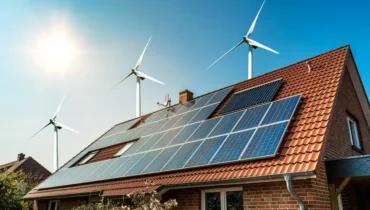Table of Contents
In the quest for sustainable and renewable energy sources, geothermal and solar power have emerged as two prominent contenders. Each of these energy options has its unique set of advantages and limitations, making it essential for individuals and businesses to understand the differences between them.
In this comprehensive comparison, we will explore the intricacies of geothermal and solar energy, allowing you to make informed decisions about which energy source aligns with your needs and goals.
Geothermal Energy: Harnessing Earth’s Heat
Geothermal energy is a remarkable method of harnessing the Earth’s natural heat reservoir. This source of renewable energy taps into the Earth’s internal heat, which is primarily generated by the radioactive decay of elements within the planet’s core.
By drilling deep wells and extracting hot water or steam from beneath the Earth’s surface, geothermal power plants can efficiently convert this heat into electricity. Geothermal energy’s unique reliability, low environmental impact, and high energy conversion efficiency make it a promising contender in the realm of sustainable power generation.
Top 6 Product Geothermal vs Solar
When comparing geothermal and solar energy systems for specific applications or products, the following aspects are worth considering:
1. Home Heating and Cooling Systems
- Geothermal: Geothermal heat pumps offer highly efficient heating and cooling for homes, using the stable underground temperatures for better energy efficiency.
- Solar: Solar thermal systems can be used for water heating and space heating, but they may not be as efficient as geothermal heat pumps.
2. Electricity Generation
- Geothermal: Geothermal power plants generate electricity consistently and reliably, making them suitable for grid power generation.
- Solar: Solar panels are widely used for residential and commercial electricity generation, especially in areas with abundant sunlight.
3. Water Heating
- Geothermal: Geothermal systems can provide hot water for residential or industrial purposes.
- Solar: Solar water heaters are a popular choice for heating water in homes and businesses, especially in sunny regions.
4. Space Heating and Cooling
- Geothermal: Geothermal heat pumps are effective for space heating and cooling in residential and commercial buildings.
- Solar: Solar thermal systems can also provide space heating, but their performance may vary with weather conditions.
5. Industrial Processes
- Geothermal: Geothermal energy can be used in industrial applications, such as drying processes and direct heat applications.
- Solar: Solar thermal systems have applications in industrial processes, such as steam generation and preheating.
6. Off-Grid Applications
- Geothermal: Geothermal energy is typically harnessed in grid-connected power plants, making it less common for off-grid use.
- Solar: Solar panels are often used in off-grid applications, providing electricity in remote areas or for mobile homes and recreational vehicles.
The choice between geothermal and solar energy products depends on the specific energy needs and location, with each having its own advantages and limitations in different applications.
How Geothermal Energy Works
Geothermal energy operates through a fascinating process that involves accessing the Earth’s internal heat. The method begins with the drilling of deep wells into the Earth’s crust, where temperatures rise significantly. These wells reach geothermal reservoirs filled with hot water or steam, a result of the planet’s geological activity.
The high-pressure steam or hot water is then harnessed to spin turbines, driving generators that produce electricity. This consistent and renewable energy source remains unaffected by external factors such as weather, making geothermal power a reliable and environmentally friendly option for electricity generation.
Advantages of Geothermal Energy
- Consistent and Reliable: Geothermal energy is highly reliable since it is not affected by weather conditions or time of day. It provides a constant source of energy.
- Low Environmental Impact: Geothermal power plants emit minimal greenhouse gases, making them an environmentally friendly choice.
- High Efficiency: Geothermal power plants have high energy conversion efficiency, making them a cost-effective option.
Limitations of Geothermal Energy
- Location-Specific: Geothermal energy is more viable in regions with active geothermal resources, limiting its global availability.
- Initial Investment: Setting up geothermal power plants can be expensive due to drilling and infrastructure costs.
Solar Energy: Harnessing the Power of the Sun
Solar energy is a renewable power source that harnesses the immense energy of the sun. It relies on photovoltaic (PV) cells, commonly known as solar panels, to capture sunlight and convert it into electricity. These PV cells contain semiconductors that absorb photons from sunlight, generating an electric current. The generated electricity can be used directly or stored in batteries for future use.
What makes solar energy particularly attractive is its abundance and accessibility. Sunlight is readily available in most parts of the world, making it a universally accessible energy source. With low operating costs, scalability, and a minimal environmental footprint during operation, solar energy has emerged as a key player in the transition to clean and sustainable energy solutions.
How Solar Energy Works
Solar energy works through the photovoltaic effect, which involves converting sunlight into electricity using solar panels. Each solar panel consists of numerous photovoltaic cells made of semiconducting materials like silicon. When sunlight hits these cells, photons in the sunlight knock electrons loose from their atoms, creating an electric current.
This direct current (DC) electricity generated by the solar panels is then transformed into alternating current (AC) through an inverter, making it suitable for use in homes and businesses. The electricity can be consumed instantly or stored in batteries for later use, providing a clean and renewable energy source.
Advantages of Solar Energy
- Abundant and Accessible: Solar energy is available almost everywhere, as long as there is sunlight. This makes it accessible to a broad range of locations.
- Low Operating Costs: Once solar panels are installed, their operating and maintenance costs are relatively low.
- Scalability: Solar systems can be easily expanded, allowing homeowners and businesses to adapt to changing energy needs.
Limitations of Solar Energy
- Intermittent Power Generation: Solar energy production is dependent on weather and time of day, which can lead to intermittency issues.
- Environmental Impact: The production of solar panels and batteries can have environmental impacts, particularly in their manufacturing and disposal.
Geothermal vs Solar: A Head-to-Head Comparison
In comparing geothermal and solar energy, we encounter two distinct approaches to harnessing renewable power. Geothermal energy taps into the Earth’s internal heat, providing a constant and reliable source of electricity. Solar energy, on the other hand, relies on capturing sunlight using photovoltaic cells and is abundant but intermittent.
Geothermal power plants have higher energy conversion efficiency, while solar panels are more affordable to install. Your choice between the two ultimately depends on your location, budget, and energy requirements, considering the trade-offs of reliability, cost-effectiveness, and environmental impact.
Cost
Geothermal energy has higher upfront costs due to drilling and infrastructure expenses. Solar energy, on the other hand, is more affordable to install and can be a cost-effective solution for individuals and businesses.
Environmental Impact
Both geothermal and solar energy are environmentally friendly. Geothermal has lower emissions, but the environmental impact of solar is mainly associated with the production and disposal of panels and batteries.
Reliability
Geothermal energy is more reliable due to its constant power generation, while solar energy depends on sunlight and may require energy storage solutions to ensure a continuous power supply.
Geographic Suitability
Geothermal energy is limited to areas with geothermal resources, whereas solar energy can be harnessed almost anywhere with access to sunlight.
Efficiency
Geothermal power plants have higher energy conversion efficiency, making them more efficient in the long run. Solar panels, while improving, still have lower efficiency levels.
FAQs
1. What is geothermal energy, and how does it work?
Geothermal energy is a renewable energy source that harnesses heat from the Earth’s interior. It works by drilling deep wells to access hot water or steam, which is then used to generate electricity in geothermal power plants.
2. How does solar energy function, and what are the key components of a solar system?
Solar energy is generated by capturing sunlight through photovoltaic cells, commonly known as solar panels. These panels convert sunlight into electricity, which can be used directly or stored in batteries for later use.
3. Which is more cost-effective, geothermal or solar energy?
Solar energy is generally more cost-effective to install due to lower upfront costs, while geothermal energy can be expensive because of drilling and infrastructure expenses. The choice depends on your location and specific energy requirements.
4. Is geothermal energy environmentally friendly?
Yes, geothermal energy is considered environmentally friendly. Geothermal power plants have low greenhouse gas emissions, making them a clean energy source.
5. How reliable is solar energy in areas with inconsistent sunlight?
Solar energy can be less reliable in areas with inconsistent sunlight. To address this, energy storage solutions such as batteries are used to store excess energy for use during cloudy or nighttime periods.
6. Can I use both geothermal and solar energy together in a hybrid system?
Yes, it is possible to combine geothermal and solar energy in a hybrid system to maximize energy generation and reduce reliance on the grid. This approach can offer more stable power generation throughout the year.
7. Are there any government incentives or tax benefits for installing geothermal or solar systems?
Many governments offer incentives and tax benefits for the installation of geothermal and solar energy systems to encourage the adoption of renewable energy. These incentives can include tax credits, rebates, and grants.
Conclusion
In the ongoing quest for sustainable energy sources, both geothermal and solar power offer valuable options. Geothermal energy is a highly reliable, low-emission solution, but it is geographically limited and involves substantial upfront costs. Solar energy, abundant and accessible, provides a cost-effective alternative with scalability but is subject to weather conditions and lower efficiency.
The choice between geothermal and solar energy ultimately depends on your location, budget, and specific energy needs. By carefully weighing the advantages and limitations of each, you can make an informed decision to contribute to a greener and more sustainable future.

